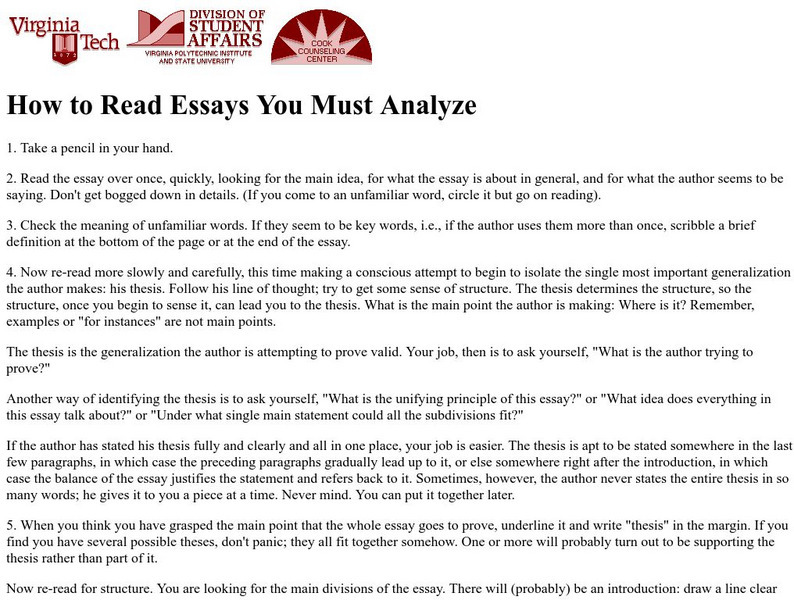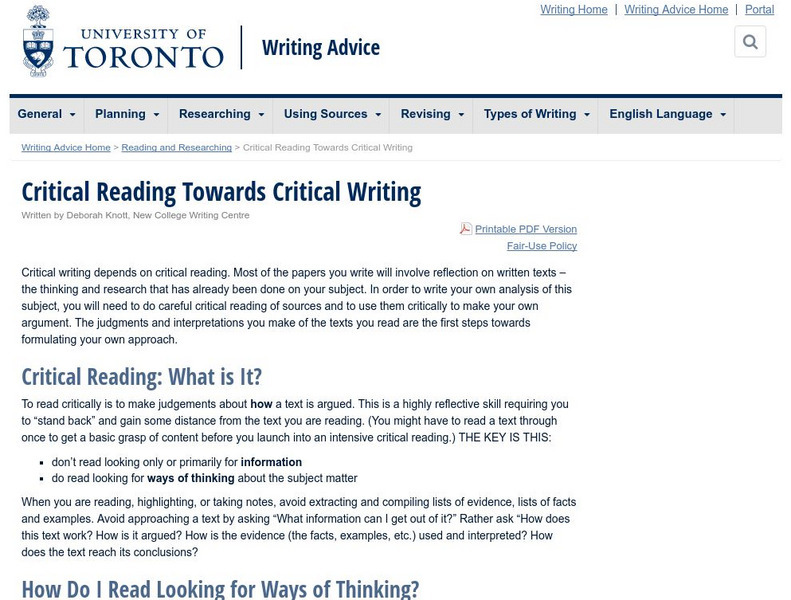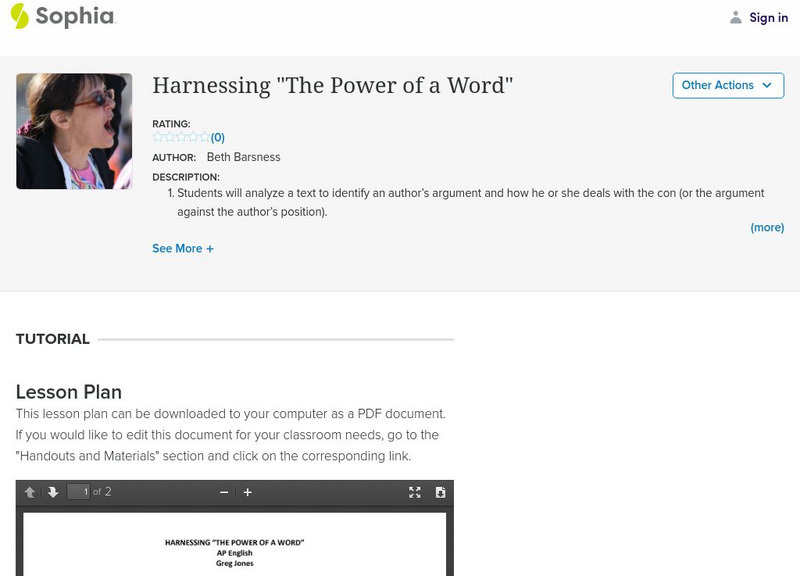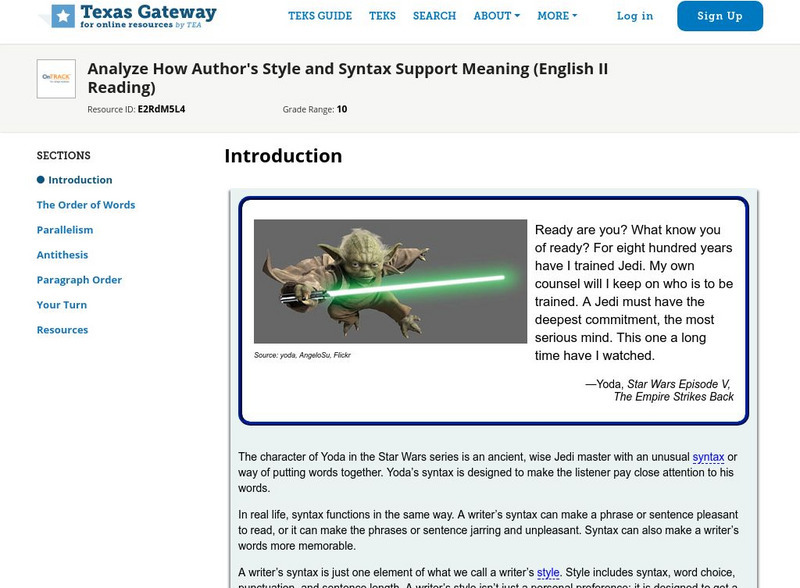Grammarly
Grammarly Handbook: Organize Your Thoughts in Patterns
Tips on organizing ideas in an essay.
Virginia Tech
How to Read Essays You Must Analyze
Provides a detailed discussion on how to approach an essay for analysis.
PBS
Pbs News Hour: Responding to Quotes and Aphorisms
The objective of this lesson plan is to teach students about responding to quotes and aphorisms. This site features a lesson plan with detailed information.
Other
Grays Harbor College: Writing Essays: Four Tips
This resource explores four tips for writers: "Center Your Thinking," "Organize Your Thinking," "Specify Your Thoughts," and "Present Your Thoughts Clearly." The information is presented in an easy-to-follow outline with examples given...
E Reading Worksheets
E Reading Worksheets: Tone Worksheets and Lessons
This learning module provides remediation and extra practice with identifying an author's tone. Reinforcement for understanding author's tone is provided through the five different worksheets and a mini-lesson. CCSS.ELA-Literacy.CCRA.R.4
Science Education Resource Center at Carleton College
Serc: Reading Reflections
An exercise consisting of three reflective questions that students respond to after completing an assigned reading in any curriculum area. The task promotes skills in critical thinking and self-assessment.
Goshen College
Goshen College: Literary Analysis Guide
This resource not only explains how to analyze a text, but also, provides student examples of literary texts. W.9-10.9b Research/Argum, RI.11-12.5 Evaluate text structure
Colorado State University
Colorado State Writing Center: Critical Reading
In-depth instructions on critical reading with lots of links to more reading guides and activities. A good site to help improve reading skills to become a better writer.
University of Toronto (Canada)
University of Toronto: Critical Reading Towards Critical Writing
Aimed particularly towards writing about non-fiction, this site describes ways to think about what you read so you can write more clearly. Focuses on analyzing the "ways of thinking" that an author uses so you can evaluate the validity...
Sophia Learning
Sophia: Harnessing "The Power of a Word"
In this PDF lesson plan, students will analyze the text "The Power of a Word" by Leonard Pitts, Jr. to identify an author's argument and how he deals with the counterargument. Students will extend the argument by agreeing or disagreeing...
Sophia Learning
Sophia: Reading Strategies: Tutorial
In this slideshow tutorial, students will review different types of reading strategies to promote comprehension of text. The strategies included are the following: making predictions, visualizing, questioning the text, retelling,...
Sophia Learning
Sophia: Referencing the Author's Purpose
This lesson explains how to reference an author's purpose when answering a reading comprehension question. This tutorial shares an audio version of the lesson's content. [3:14] RI.11-12.6 Eval Purpose, Rhetoric, Style
Sophia Learning
Sophia: Rhetorical Analysis of "So This Was Adolescence"
This PDF lesson plan prepares students for multiple portions of the AP Language and Composition exam (specifically, the multiple choice section and the rhetorical analysis prompt) by analyzing a brief text which students will be able to...
Sophia Learning
Sophia: Selecting Topics for Literary Analysis
A series of three PDF documents providing definitions of commonly used terms when preparing to write a literary analysis, explaining how to comment on a literary text, and demonstrating the process of analyzing the literary text "Hills...
Colorado State University
Writing@csu Guide: Understanding Writing Situations
In this guide, you can learn more about the situations in which writers and readers find themselves and the physical, social, cultural, and historical contexts that shape them. Click on each of the links on the right to learn about the...
21st Century Schools
21st Century Schools: Critical Viewing Skills and Media Literacy
Understand media literacy as it relates to a student's ability to analyze, evaluate, critique and produce multiple media messages. Information and links to inspire students, teachers and all those who work with young people regarding...
ReadWriteThink
Read Write Think: Defining and Exploring an Author's Stylistic Choices
Contains plans for two lessons that teach students how to recognize an author's use of style in literature. These plans use "Their Eyes Were Watching God" by Zora Neale Hurston as an example, but the basic ideas can be adapted to other...
Sophia Learning
Sophia: The Impact of Rhetorical Devices
This slideshow focuses on the impact of rhetorical devices and how they impact text. It explains eight common rhetorical devices: anaphora, asyndeton, chiasmus, direct address, hyperbaton, parallelism, polysyndeton, and rhetorical...
Varsity Tutors
Varsity Tutors: Web English Teacher: Expository Writing
This Web English Teacher provides great links and resources for assistance, activities, and information about expository writing.
Tom Richey
Slide Share: Author's Purpose and Point of View
This downloadable slideshow focuses on how an author's purpose and point of view work together in fiction and nonfiction, and how to identify the point of view.
Texas Education Agency
Texas Gateway: Analyze Texts With Similar/different Purposes
[Accessible by TX Educators. Free Registration/Login Required] Make complex inferences and use textual evidence such as imagery and figurative language to support understanding.
Texas Education Agency
Texas Gateway: Analyze Point of View in Literary Texts/fiction
Identify and understand an author's choice of point of view, including limited versus omniscient and subjective versus objective.
Texas Education Agency
Texas Gateway: Analyze Shifts in Perspective in Informational/persuasive Text
[Accessible by TX Educators. Free Registration/Login Required] Explain shifts in perspectives in the same argument and make decisions about support used in those arguments.
Texas Education Agency
Texas Gateway: Analyze How Author's Style and Syntax Support Meaning
Analyze how an author's style and syntax support meaning in a text. RI.9-10.3 author unfolds. CCSS.ELA-Literacy.CCRA.L.3


















